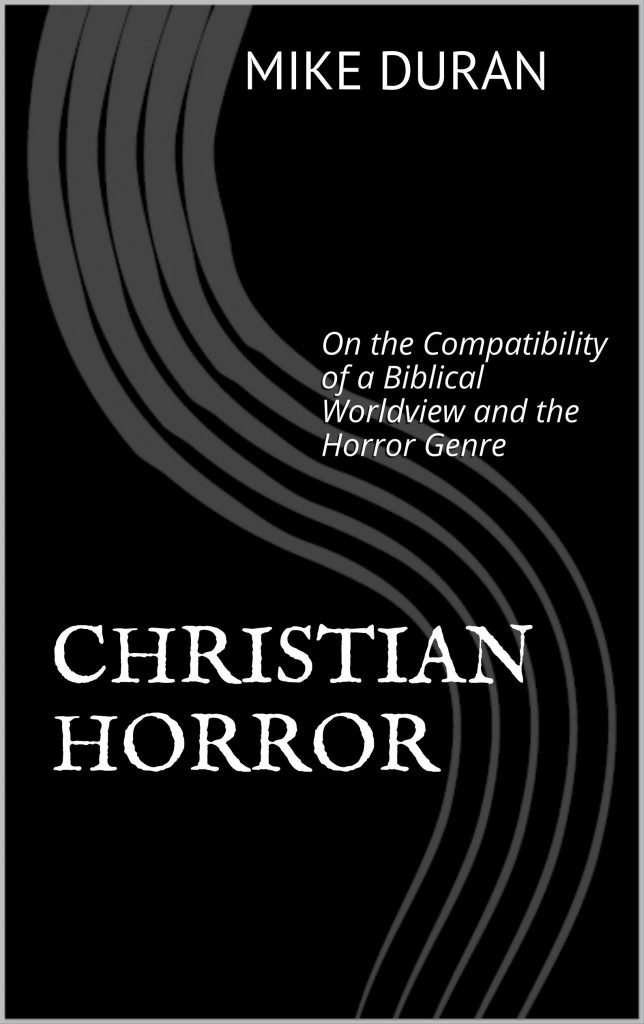Horror Is Based on A Biblical Worldview, Part 2
 Novelist Mike Duran continues a two-part conversation to share the stories and themes of his new nonfiction work about Christians-exploring-horror, Christian Horror. (Read part 1.)
Novelist Mike Duran continues a two-part conversation to share the stories and themes of his new nonfiction work about Christians-exploring-horror, Christian Horror. (Read part 1.)
ESB: Often I hear horror critics/skeptics use verses such as Phil. 4:8 and Eph. 5:12 to criticize horror. Horror apologists will often reply with, “Well, the Bible itself includes themes of horror.” But the critics/skeptics then repeat one of these rebuttals. You’ve already discussed some of this at your website, but can you rephrase your challenges to the critics/skeptics?
1) “The Bible has sparser descriptions than a modern novelist.”
Mike: Probably because the Bible is not a novel. If the argument is that vivid descriptions of biblical events are prohibited, I would ask if that applies to every biblical event or just the gruesome, lurid ones. Should we also refrain from a detailed fictionalization of Moses on Mount Sinai, the Resurrection, or Saul’s Damascus Road experience? If not, then why are the “darker” elements of Scripture avoided and not the “lighter” ones? Bottom line: The role and intent of film and fiction is a lot different than that of the Bible.
2) “The Bible is using words, but movies/TV actually show the grotesque thing happening.”
Mike: That’s the power of the medium. Conversely, is “showing” a good thing tolerable? In other words, showing Jesus healing the Gadarene demoniac is okay, but showing the same man running naked and gibbering through the tombs is not?
Unless we’re arguing that celluloid / digital images are inherently evil, we’re going to run into the typical debate about what images Christians should and should not subject themselves to. You know, Is it OK to watch R-rated movies? and all that.
It’s one thing to object to movies/TV on the grounds that the medium is inherently evil. But objecting to certain images on the grounds that they are disturbing, provocative, or offensive, opens an entire other discussion, one which involves the subject of Christian liberty and the role of art. In reality, I think that is the discussion more Christians are hinting at when they object to horror.
Furthermore, an argument could be made that Christians should not turn away from looking at evil and darkness. I’ve always loved the quote attributed to famed Japanese director Akira Kurosawa who said, “The role of the artist is to not look away.”
Our world is full of real-life horrors that Christians should not look away from. This doesn’t mean that we should delight in evil, be captivated by the macabre, or celebrate darkness, but that our perspective of the world and the human condition should be unflinching. Watching an exorcism is disturbing. It should be! But if we really believe demons can possess someone and Christ has the power to free them, enduring the horror of the event may be necessary. Abortion, genocide, sex slavery, ritual murder, or serial killings are horrific. But refusal to look upon and think about evil may itself be evil.
In this sense, thinking about “whatever is true” (Phil. 4:8) can serve as a proof text for thinking about horror, not turning away from the vile and depraved. A “true” picture of our world must include its horrors.
ESB: What are the best or most poignant Scriptural examples of horror genre(s) in action?
 Mike: Where to begin? Why not at the beginning where a perfect Man and Woman turned from their Creator, unleashing an evil force (sin) upon the earth. Sounds like the basis for a good horror flick, huh? (Man defies warning and darkness falls.) The Fall of Man may be the most horrific of all biblical concepts.
Mike: Where to begin? Why not at the beginning where a perfect Man and Woman turned from their Creator, unleashing an evil force (sin) upon the earth. Sounds like the basis for a good horror flick, huh? (Man defies warning and darkness falls.) The Fall of Man may be the most horrific of all biblical concepts.
On a personal level, I’ve always found Gustave Dore’s “Adam and Eve Driven Out of Eden” deeply disturbing. The cherubim with “a flaming sword flashing back and forth to guard the way to the tree of life (Gen. 3:24, NIV) must have been a terrible, majestic thing.
So many biblical “terrors” can be traced back this event, namely the Crucifixion where an infinitely holy God, the Last Adam, suffered a torturous death and bore the sin of the world. (Knowing what we now know about Roman crucifixion, it’s not a surprise that Mel Gibson’s The Passion of the Christ has been labeled “horror” by some.)
In fact, many of our “standard” Bible stories contain disturbing and horrific elements. Noah’s Flood, the plagues of Egypt and the Passover (especially the angel of death slaughtering Egypt’s firstborn), Elisha and the prophets of Baal, Saul and the Witch of Endor, the Slaughter of the Innocents, and perhaps the greatest of all, the Book of Revelation with its depiction of cosmological upheaval, plagues, the antichrist, and the Great White Throne Judgment. Perhaps this is why the Horror Writers of America includes the Bible in its canon of horror literature.
ESB: I’d like to set this one up a little more. Again, on your own site you explored more of this topic. You also dealt with a “shutdown” verse I often hear: Ephesians 5:12, which says, “For it is shameful even to speak of the things that they [unfruitful works of darkness] do in secret.”
The skeptic says: “There you go — you should not even be speaking of works of darkness.”
Again, apologists reply with, “But the Bible speaks of dark things in a way.” But I think this could reinforce the critic’s false assumption: that we’re bound to write for exactly the same reasons and in the same way the biblical authors write. Instead shouldn’t we be challenging that assumption? “Where in the Bible does it say we are limited to its stylistic choices? Where in the Bible are you getting the idea that merely hearing/seeing a sin described is the same thing as committing the same sin?” And of course, “If it’s always wrong to see/hear about sin, why make the Bible the exception — and aren’t we always singling out specific sins anyway?”
Mike: I agree with you, Stephen. Those who object to horror often import arguments based on a dangerously narrow view of art and culture.
In Christian Horror, I suggest that this traces back to an ultra-conservative Fundamentalist view of the world, one which has led to the creation of a Christian sub-culture. In this circle, holiness is viewed as abstinence from certain images or cultural commodities. It’s a “touch not, taste not” ethic (Col. 2:20-23) that defines holiness in terms of the types of films, television, music, and books we enjoy. It’s led to an entire class of “professional weaker brothers,” those who object to films and fiction based on the number of curse words or sexual innuendoes. Which is why “clean,” “family-friendly” fare is advocated.
This perspective is unique to evangelicals, as opposed to Catholics who have been historically much more active in and less restrictive of the arts. To me, this entire discussion comes back to our theology and how it influences our perspective of art and culture.
ESB: What do you hope Christian Horror will do for fans, readers, and the Church as a whole?
Mike: All I’m really hoping to do is continue a conversation that’s been going on for a while about the Church and culture. As an evangelical, and as someone who traffics in evangelical fiction circles, I think we’re missing some great opportunities to grow and employ cultural mediums with more savvy and effectiveness; to expand our vision for artists and the arts. My entire thesis in Christian Horror is that not only is the horror genre compatible with a biblical worldview, but that I believe Christian artists should be at the forefront of reclaiming it.
Sure, there’s a lot of junk in the horror genre. But that same critique could be said of other genres. What we should acknowledge is that horror can also be a powerful medium. For me, this is the conversation I hope to continue.
Godspeed, Mike. You can read a preview of Christian Horror or purchase the book on Amazon.






































Thank you so much for bringing attention to this topic. I haven’t yet seen anyone address it specifically, but it’s been something on my mind a lot because my book REFLECTIONS should really be categorized as Christian horror, but I’ve hesitated to call label it “Christian horror” because I’m not sure Christian readers would understand.
Some of my friends and I have had the exact type of conversations Mike mentioned, with the same arguments. “What about Philippians 4:8? Shouldn’t we think about good things?” And my response was much the same as Mike’s: “The world is full of horrors. Isn’t there a time to look the darkness in the eye and stop pretending it doesn’t exist? Will we ever be the Christians we ought to be if we avoid calling the darkness what it is? Can we understand mercy and light before we have understood judgment and darkness?”
Plus, there are Christians who come from a background with a lot of horror (for example, I know some people who used to be involved heavily in the occult), and Christian horror can give them a basis from which to understand dark and satanic things from a right and Biblical perspective.
Thanks for tackling a topic that I feel merits some real discussion!
Really interesting, thank you! I totally agree with you when you point out that evangelical Christians can get caught so easily in a Christian sub-culture whose gates are pretty narrow indeed. It’s the thing that drives me crazy about much of Christian fiction, but I’m glad to see there are writers who are pushing open those gates and challenging us to see further and think more deeply.
Tell me about it. It irks me so much that my mom’s first comment about Age of Ultron (AGE OF ULTRON, mind you, not any horror flick) was “movies are so violent!”
The Bible is so violent too tho
(I know, an uncreative and cliched response; nonetheless an apt one.)
But to be fair, there are some ridiculously violent movies that are violent for the sake of violence. Quentin Taranatino, I’m looking at you. Which I think points to what Mike Duran is saying here. If there is context to the “negative” element, whether it be horror or witchcraft or violence or swearing or whatever, such that there is a reason for it to be there in the story as opposed to being titallating and gratuitous, then it can be a positive element in the story, in a way. Contrast Schindler’s List, to Inglorious Basterds. Both violent films, showing brutal people doing brutal things. Which one makes you think about deeper themes like sacrifice, the abuse of power, redemption, etc?